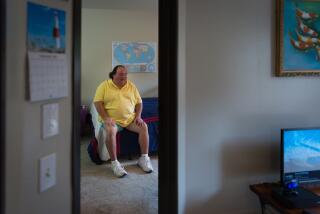Military Families’ Health Plan Renewed
- Share via
A federal experiment in holding down military health care costs will continue for another year, the contractor for the nearly $3-billion program announced Thursday.
Daniel D. Crowley, president and chief executive officer of the Foundation Health Corp., of Sacramento, said the contract extension was “the smoothest ever, and speaks of Foundation’s substantially improved relationship with the Department of Defense.” The announcement came on the eve of the old contract’s expiration.
In 1988, Congress authorized CHAMPUS Reform Initiative to try to cut the expanding cost of providing medical care in the civilian sector to military dependents and retirees.
Although the Department of Defense project is mandated for five years, the contract for administering it must be renewed annually.
CHAMPUS is an acronym for the government’s health insurance program for military and their families provided through civilian sources. Military hospitals and clinics give priority to active-duty personnel over dependents and retirees.
Foundation will be paid $578 million during the contract year to coordinate health care services for 860,000 people in California and Hawaii, most of them military dependents and retirees.
Southern California and especially San Diego County have been key parts of the experiment because so many CHAMPUS-eligible people live here. About 430,000 are in Southern California, more than half of those in San Diego County.
The Southern California portion of CRI is administered by Partners Health Plans, a subsidiary of Aetna.
The CRI experiment has compiled a 10,000-provider health care network whose physicians agree to charge fixed rates for CHAMPUS services.
Patients are offered low co-payments if they use an HMO-type network or a preferred-provider organization, both of which limit the choices of doctors. They can still choose doctors outside the network, but pay a higher co-payment if they do.
CRI looked shaky in the first couple of years, however, because Foundation had problems paying claims promptly and answering complaints. This led Congress last year to delay a planned expansion of the program to other states.
In a stepped-up public relations campaign since then, Foundation has contended that statistical studies show the program has saved both the government and patients money and made access to care easier.
Foundation claims a 91% overall satisfaction with the CRI among those who have joined the health maintenance organization. However, only 10% of the eligible 860,000 people in California and Hawaii have joined the HMO. Two-thirds of the people joining are in Southern California.
It also claims to have saved $133 million, or 22.6%, that otherwise would have been paid out for CHAMPUS claims between April, 1989 and June, 1990, according to a report by accounting firm Laventhol & Horwath.
Susan Hosek, lead author of a still-unreleased RAND Corp. evaluation of CRI, emphasizes that researchers simply do not have enough information to attribute cost savings to the initiative itself.
But Christopher Drake, director of corporate communications for Foundation, said, “All the indicators are if you look at it carefully that it really is making a difference.”
More to Read
Sign up for Essential California
The most important California stories and recommendations in your inbox every morning.
You may occasionally receive promotional content from the Los Angeles Times.












